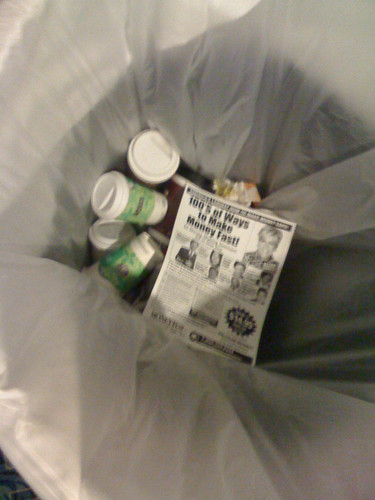Irresponsible Study Claims Counterfeiting Is A Good Thing
An adviser to the British Home Office has co-written a study claiming that counterfeit designer goods aren’t really that bad for the fashion industry, The Daily Mail reports. In fact, the study claims, counterfeit goods have less of a financial impact on the rag trade than we previously thought, and that selling fake Louis Vuitton Speedy 25s on the side of the road is really a good thing:
Professor David Wall, who co-authored the report and advises the government on crime, said the real cost to the luxury goods industry could be one-fifth of previously calculated figures.
‘It’s probably even less,’ he said yesterday. ‘There is also evidence that it actually helps the brands, by quickening the fashion cycle and raising brand awareness.’
He added: ‘We should be focusing on the trade in counterfeit drugs, dodgy aircraft parts and other stuff that really causes public harm.
But that misguided pronouncement takes for granted that counterfeiting is an honest business that operates within the bounds of other legitimate enterprises. In reality, nothing could be further from the truth. The reason that counterfeiting is called counterfeiting is because it’s illegal, and for Wall or anyone else to say that it’s not as illegal as, say, the international trafficking of drugs, smacks highly of stupidity and snobbery.
Just because someone sells a low-rent copy of a high-end bag does not mean he or she is a nice person who’s interested in getting fashion on the cheap. It means he or she is engaged in a criminal activity that largely relies on child labor and seedy customs officials who are on the take. Making fake bags is just as bad as making fake currency, and it does serious damage to a multibillion dollar global industry that shoulders its fair share of our world’s economy. Why counterfeiting in fashion should be taken any less seriously than counterfeiting in the pharmaceutical industry, we’ll never understand.
In fact, when the good people at Harper’s Bazaar hosted a panel on anti-counterfeiting measures in May, they found that the business of counterfeiting supports terrorism, takes money away from hardworking people and can even be hazardous to your skin — a L’Oreal employee at the panel said we probably wouldn’t want to know what was in knockoff cosmetics.
To wit, industry insiders told The Daily Mail that counterfeiting really is bad for business:
A spokesman for Louis Vuitton said: ‘The sale of counterfeit goods is a serious offence whose revenue funds criminal organisations at the expense of consumers, companies and governments.’
A spokesman for Burberry said: ‘Counterfeiting is taken extremely seriously. Where a case is proved, Burberry will always push for the maximum penalty.’
The Association of Chief Police Officers (ACPO) insisted that far from making consumers happy faking fashion goods was ‘not a victimless crime’.
‘Businesses, individuals, and the public purse all suffer as a result of such activities,’ said a spokesman.
And we’re inclined to agree with comments like that from people who actually know something about the fashion industry. Wall himself has an impressive CV and has written a long list of books about crime and the Internet, but we were hard pressed to find evidence that he could tell Chanel from Chloe. So we’re gonna stick with the camp that says fake fashion really is a bad thing.
[The Daily Mail via NYMag]
Get Styleite directly to your inbox,
on Twitter,
and on Facebook!
The point behind this meeting, the TechCrunch founder says, was to talk about how the super-angels (some of whom may appear on these lists) could consolidate their power within the Valley ecosystem and win more market share away from the traditional Sand Hill Road VC firms. And are they planning to do this by offering better service to the entrepreneurs whose pain they claim to share? Not according to some of those in attendance at the meeting, who said that the topics discussed included how to blunt the competitive force of YCombinator, how to keep valuations down and how to convince startups not to use convertible notes for financings.
If these reports are true, that doesn’t sound very super at all. In fact, it sounds just like the traditional VC mentality that super-angels were supposed to be fighting against — the win-at-any-cost, anything-is-fine-if-I-get-my-cut attitude that startups have been up against for decades. What happened to the “sharing your pain” approach? What happened to the “act like a startup” motto that some have advocated?
This latest development, if true, is the continuation of a perverse trend in which everyone chooses to focus on the investors instead of on startups and what is good for them. After all, the entrepreneur is supposed to be the one at the heart of this whole process — who is looking out for his or her interests? No one, it seems. It’s ironic that the movie “Wall Street 2″ is going to be opening in theatres soon, and the atmosphere in the VC world seems to be very much like the one that Gordon Gekko raved about in the original.
Everyone knows the VC game is tough, even for super angels — especially when hundreds of them throng to a YCombinator event to see just a handful of promising startups. No one thinks it should just be one big Kumbaya singalong, by any means. But it’s one thing to run a business and another to be advocating that everyone gang up to drive valuations down, or to stop the use of convertible notes — which are a startup-friendly trend that many non-super angels and startup advisors have been promoting. It’s a little sad to hear that some of the same people who have been saying publicly that they were on the side of startups may be saying something completely different in private.
The last time professional investors spent so much time thinking about what they were getting out of the deal rather than focusing in building a healthy startup community, it was the late 1990s, and it didn’t end well. If the super-angels and traditional VCs alike spent a bit more time thinking about the entrepreneurs at the heart of this whole equation and a little less thinking about ways to line their own pockets at his or her expense, we would probably all be a lot better off.
Related GigaOM Pro content (sub req’d):
Did We Really Learn Anything From the Dotcom Crash?
Lessons From Twitter: How to Play Nice With Ecosystem Partners
Why Google Should Fear the Social Web
New York Times Backs <b>News</b>-Aggregation Software Company | Russell <b>...</b>
The New York Times Co. is joining a group of news organizations in backing the maker of software that helps publishers aggregate news, according to a person familiar with the matter. The company, called Ongo, filed a trademark ...
Weather HD comes to iPhone, iPod touch | iLounge <b>News</b>
iLounge news discussing the Weather HD comes to iPhone, iPod touch. Find more Apps + Games news from leading independent iPod, iPhone, and iPad site.
Murata Seisakusho Robot Learns New Skill « Akihabara <b>News</b>
To pursue its growth Akihabara News is seeking for several more editors via an intership program for 6 to 9 months. Please send us a mail @ jobs@akihabaranews.com. Message. We are moving away from Feedburner, please update your RSS ...
benchcraft company scam
bench craft company rip off
New York Times Backs <b>News</b>-Aggregation Software Company | Russell <b>...</b>
The New York Times Co. is joining a group of news organizations in backing the maker of software that helps publishers aggregate news, according to a person familiar with the matter. The company, called Ongo, filed a trademark ...
Weather HD comes to iPhone, iPod touch | iLounge <b>News</b>
iLounge news discussing the Weather HD comes to iPhone, iPod touch. Find more Apps + Games news from leading independent iPod, iPhone, and iPad site.
Murata Seisakusho Robot Learns New Skill « Akihabara <b>News</b>
To pursue its growth Akihabara News is seeking for several more editors via an intership program for 6 to 9 months. Please send us a mail @ jobs@akihabaranews.com. Message. We are moving away from Feedburner, please update your RSS ...
bench craft company rip off bench craft company rip off
Irresponsible Study Claims Counterfeiting Is A Good Thing
An adviser to the British Home Office has co-written a study claiming that counterfeit designer goods aren’t really that bad for the fashion industry, The Daily Mail reports. In fact, the study claims, counterfeit goods have less of a financial impact on the rag trade than we previously thought, and that selling fake Louis Vuitton Speedy 25s on the side of the road is really a good thing:
Professor David Wall, who co-authored the report and advises the government on crime, said the real cost to the luxury goods industry could be one-fifth of previously calculated figures.
‘It’s probably even less,’ he said yesterday. ‘There is also evidence that it actually helps the brands, by quickening the fashion cycle and raising brand awareness.’
He added: ‘We should be focusing on the trade in counterfeit drugs, dodgy aircraft parts and other stuff that really causes public harm.
But that misguided pronouncement takes for granted that counterfeiting is an honest business that operates within the bounds of other legitimate enterprises. In reality, nothing could be further from the truth. The reason that counterfeiting is called counterfeiting is because it’s illegal, and for Wall or anyone else to say that it’s not as illegal as, say, the international trafficking of drugs, smacks highly of stupidity and snobbery.
Just because someone sells a low-rent copy of a high-end bag does not mean he or she is a nice person who’s interested in getting fashion on the cheap. It means he or she is engaged in a criminal activity that largely relies on child labor and seedy customs officials who are on the take. Making fake bags is just as bad as making fake currency, and it does serious damage to a multibillion dollar global industry that shoulders its fair share of our world’s economy. Why counterfeiting in fashion should be taken any less seriously than counterfeiting in the pharmaceutical industry, we’ll never understand.
In fact, when the good people at Harper’s Bazaar hosted a panel on anti-counterfeiting measures in May, they found that the business of counterfeiting supports terrorism, takes money away from hardworking people and can even be hazardous to your skin — a L’Oreal employee at the panel said we probably wouldn’t want to know what was in knockoff cosmetics.
To wit, industry insiders told The Daily Mail that counterfeiting really is bad for business:
A spokesman for Louis Vuitton said: ‘The sale of counterfeit goods is a serious offence whose revenue funds criminal organisations at the expense of consumers, companies and governments.’
A spokesman for Burberry said: ‘Counterfeiting is taken extremely seriously. Where a case is proved, Burberry will always push for the maximum penalty.’
The Association of Chief Police Officers (ACPO) insisted that far from making consumers happy faking fashion goods was ‘not a victimless crime’.
‘Businesses, individuals, and the public purse all suffer as a result of such activities,’ said a spokesman.
And we’re inclined to agree with comments like that from people who actually know something about the fashion industry. Wall himself has an impressive CV and has written a long list of books about crime and the Internet, but we were hard pressed to find evidence that he could tell Chanel from Chloe. So we’re gonna stick with the camp that says fake fashion really is a bad thing.
[The Daily Mail via NYMag]
Get Styleite directly to your inbox,
on Twitter,
and on Facebook!
The point behind this meeting, the TechCrunch founder says, was to talk about how the super-angels (some of whom may appear on these lists) could consolidate their power within the Valley ecosystem and win more market share away from the traditional Sand Hill Road VC firms. And are they planning to do this by offering better service to the entrepreneurs whose pain they claim to share? Not according to some of those in attendance at the meeting, who said that the topics discussed included how to blunt the competitive force of YCombinator, how to keep valuations down and how to convince startups not to use convertible notes for financings.
If these reports are true, that doesn’t sound very super at all. In fact, it sounds just like the traditional VC mentality that super-angels were supposed to be fighting against — the win-at-any-cost, anything-is-fine-if-I-get-my-cut attitude that startups have been up against for decades. What happened to the “sharing your pain” approach? What happened to the “act like a startup” motto that some have advocated?
This latest development, if true, is the continuation of a perverse trend in which everyone chooses to focus on the investors instead of on startups and what is good for them. After all, the entrepreneur is supposed to be the one at the heart of this whole process — who is looking out for his or her interests? No one, it seems. It’s ironic that the movie “Wall Street 2″ is going to be opening in theatres soon, and the atmosphere in the VC world seems to be very much like the one that Gordon Gekko raved about in the original.
Everyone knows the VC game is tough, even for super angels — especially when hundreds of them throng to a YCombinator event to see just a handful of promising startups. No one thinks it should just be one big Kumbaya singalong, by any means. But it’s one thing to run a business and another to be advocating that everyone gang up to drive valuations down, or to stop the use of convertible notes — which are a startup-friendly trend that many non-super angels and startup advisors have been promoting. It’s a little sad to hear that some of the same people who have been saying publicly that they were on the side of startups may be saying something completely different in private.
The last time professional investors spent so much time thinking about what they were getting out of the deal rather than focusing in building a healthy startup community, it was the late 1990s, and it didn’t end well. If the super-angels and traditional VCs alike spent a bit more time thinking about the entrepreneurs at the heart of this whole equation and a little less thinking about ways to line their own pockets at his or her expense, we would probably all be a lot better off.
Related GigaOM Pro content (sub req’d):
Did We Really Learn Anything From the Dotcom Crash?
Lessons From Twitter: How to Play Nice With Ecosystem Partners
Why Google Should Fear the Social Web
benchcraft company scam
New York Times Backs <b>News</b>-Aggregation Software Company | Russell <b>...</b>
The New York Times Co. is joining a group of news organizations in backing the maker of software that helps publishers aggregate news, according to a person familiar with the matter. The company, called Ongo, filed a trademark ...
Weather HD comes to iPhone, iPod touch | iLounge <b>News</b>
iLounge news discussing the Weather HD comes to iPhone, iPod touch. Find more Apps + Games news from leading independent iPod, iPhone, and iPad site.
Murata Seisakusho Robot Learns New Skill « Akihabara <b>News</b>
To pursue its growth Akihabara News is seeking for several more editors via an intership program for 6 to 9 months. Please send us a mail @ jobs@akihabaranews.com. Message. We are moving away from Feedburner, please update your RSS ...
bench craft company rip off bench craft company rip off
New York Times Backs <b>News</b>-Aggregation Software Company | Russell <b>...</b>
The New York Times Co. is joining a group of news organizations in backing the maker of software that helps publishers aggregate news, according to a person familiar with the matter. The company, called Ongo, filed a trademark ...
Weather HD comes to iPhone, iPod touch | iLounge <b>News</b>
iLounge news discussing the Weather HD comes to iPhone, iPod touch. Find more Apps + Games news from leading independent iPod, iPhone, and iPad site.
Murata Seisakusho Robot Learns New Skill « Akihabara <b>News</b>
To pursue its growth Akihabara News is seeking for several more editors via an intership program for 6 to 9 months. Please send us a mail @ jobs@akihabaranews.com. Message. We are moving away from Feedburner, please update your RSS ...
benchcraft company scam benchcraft company scam
New York Times Backs <b>News</b>-Aggregation Software Company | Russell <b>...</b>
The New York Times Co. is joining a group of news organizations in backing the maker of software that helps publishers aggregate news, according to a person familiar with the matter. The company, called Ongo, filed a trademark ...
Weather HD comes to iPhone, iPod touch | iLounge <b>News</b>
iLounge news discussing the Weather HD comes to iPhone, iPod touch. Find more Apps + Games news from leading independent iPod, iPhone, and iPad site.
Murata Seisakusho Robot Learns New Skill « Akihabara <b>News</b>
To pursue its growth Akihabara News is seeking for several more editors via an intership program for 6 to 9 months. Please send us a mail @ jobs@akihabaranews.com. Message. We are moving away from Feedburner, please update your RSS ...
bench craft company rip off





